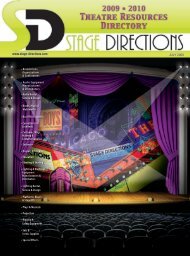May Issue - Stage Directions Magazine
May Issue - Stage Directions Magazine
May Issue - Stage Directions Magazine
Create successful ePaper yourself
Turn your PDF publications into a flip-book with our unique Google optimized e-Paper software.
Courtesy of Michael McGarty<br />
Getting Out, by the Broomfield School Drama Society; Michael McGarty acted as director.<br />
recommended. “In this case, a large<br />
musical too often becomes a vehicle<br />
to showcase the musical talent of<br />
the actors, with the acting taking a<br />
back seat,” says McGarty. “The proof<br />
comes during the production week,<br />
when the musical director adds in an<br />
orchestra and stage technicians in<br />
addition to the actors, and can’t figure<br />
out why all the elements won’t magically<br />
come together. The only time<br />
I see this type of situation working<br />
is with small, intimate musicals, like<br />
Little Shop of Horrors and Nunsense,<br />
or revues, where a musical director<br />
and chor<br />
e o g r a -<br />
pher work<br />
together<br />
to create<br />
the<br />
piece.”<br />
parts of a production that I can collaborate<br />
easily on, and other parts<br />
of a production where I’d prefer the<br />
musical director takes a back seat.<br />
There has to be a good balance of acting,<br />
music and dance for the show to<br />
be successful. If the director, musical<br />
director or choreographer try to make<br />
the show more about their specific<br />
area rather than the whole, the entire<br />
show will suffer.”<br />
Even the most collaborative directors<br />
may feel amrmers make invaluable<br />
gains from the work, improving<br />
the production as a result.<br />
“It can only work if the<br />
director is somewhat superhuman, and<br />
frankly, not many of us are.”<br />
—Michael McGarty<br />
The Dream Team<br />
A smart director sees his/her work<br />
with a musical director as an equal<br />
partnership from the get-go. “You<br />
need to know your staff,” advises<br />
Vrattos. “Meet them ahead of time.<br />
Ideally, be responsible for hiring so<br />
you can really choose who you want<br />
to work with.”<br />
Make sure you mesh personalitywise<br />
as well. “Getting along with a<br />
musical director can be the biggest<br />
challenge of the show,” says McGarty.<br />
“I always have a long discussion with<br />
any new musical director well in<br />
advance to set the ground rules for<br />
who will play what role. There are<br />
“Understand that you can’t do it all<br />
by yourself,” says Kelly Ford, a musical<br />
director/producer/engineer whose<br />
theatre experience also includes her<br />
position as artistic director of the<br />
Medieval Manor Theater Restaurant<br />
in Boston. “Divide and conquer when<br />
possible. Often in a musical production,<br />
there will be times when I need<br />
to work with a soloist or a small group<br />
of kids on something specific. That<br />
leaves the rest of the group to sit<br />
quietly and watch — good luck with<br />
that! Kids like having your attention,<br />
especially when they aren’t the center<br />
of it.” Ford suggests putting the<br />
other young performers to work on<br />
www.stage-directions.com • <strong>May</strong> 2007 37

















